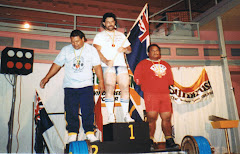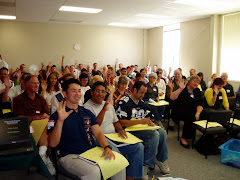 training etc... You've committed yourself to researching the field. So how do you know if you are practicing, applying or demonstrating what you have learnt, correctly?
training etc... You've committed yourself to researching the field. So how do you know if you are practicing, applying or demonstrating what you have learnt, correctly?If mastery is the objective. Then feedback is a must!
Be Careful
 e has an exceptional grasp of the sport and the ability to teach the necessary skills to elite players, byway of giving effective feedback to them. This is a common theme amongst great sports coaches. They are great communicators, have an indepth knowledge of the sport and know how to "read" the players they coach. They can identify with ease the small intricasies that make the difference to a players long term performance gains.
e has an exceptional grasp of the sport and the ability to teach the necessary skills to elite players, byway of giving effective feedback to them. This is a common theme amongst great sports coaches. They are great communicators, have an indepth knowledge of the sport and know how to "read" the players they coach. They can identify with ease the small intricasies that make the difference to a players long term performance gains.Ask Yourself
- How willing are you to recieve feedback?
- How coachable are you?
- Are you a know-it-all?
- Have your achievements distanced you from receiveing feedback?
- Do you believe you have more to learn?
- Do you believe that mastery is to be pursued and not a destination?
- How quickly do you take on the feedback and make the necessary changes?
- Do you argue with the person giving you feedback?
- Do you say "...yea BUT..." ?
- Do you brush feedback off given to you, and mumble "...what would they know..." ?
- How quickly are you willing to learn and unlearn?
Difficult Times
One of the most difficult things I have found that determines the receptivity to feedback I've given to others in the past, is the level of success they have already had. Their success becomes a convincer for them that what they have been doing works for them! When in fact, they need to put away some of what they do, even though it has gained them a degree of success to date. And take on t he feedback being given to them, which will initially result in a momentary loss in their progress, yet take them to a higher performance level over the long run.
he feedback being given to them, which will initially result in a momentary loss in their progress, yet take them to a higher performance level over the long run.
Tiger Woods, changing his technqiue is a good example of how he was willing to make changes to his golf swing and embrace the learning cycle performance dip, to gain an increase in performance long term.
Willingness
Your willingness to embrace feedback will be the limiter or determiner of whether you ever achieve mastery. Masters know that they require, hunger, thirst and constantly pursue - feedback. They even have the advanced skill of being able to filter out, from intentionally bad feedback/comments thrown at them, and take from that, anything that will assist them to improve their performance (advanced skill).
Most people will struggle with feedback given from people that actually care for them. Let alone being able to learn from those that are jealous of their success, or even hate their guts!
Find Someone
- Who are you willing to provide you with feedback?
- Are you able to get feedback from someone who has your best interests at heart?
- Who do you know that could help you with mastering the skills and attitude you need to be great at what you do?
Do something about having someone provide you with feedback. Be open and receptive to receiving feedback, or they'll never give it to you again. When you ask make sure your cup is empty. A cup is only useful if it is empty!!!
(No, I'm not going to explain the metaphor for you - work it out!).
Over the years I have been asked by many to give them feedback. Few really, truely want it. What I've found is, they want praise that will bolster their egos, confirmation of what they are doing already as being right or an opportunity to say what they know.
As Easy As 1,2,3
It's in my mind, as simple as this:
- Seek out feedback
- Apply it to yourself as quickly as possible
- Practice what you have learnt
- Review your progress
- Ask for more feedback, and begin again at step 1 (Mastery learning cycle)
Oh, and I also, am happy to recieve your feedback so leave a comment. Thanks for reading.
Pictures are of: Lance Armstrong, Graham Henry, Tiger Woods.






































































